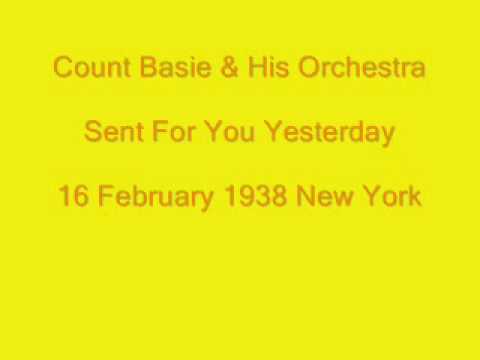As we prepare for W. C. Handy & the Birth of the Blues with program consultant Elliott Hurwitt, we revisit his first week hosting Song of the Day. This song was originally posted on October 28, 2015.
They called the Count Basie Orchestra “The Band That Plays the Blues.” Its All-American Rhythm Section (Basie on piano; Freddie Greene on guitar, Walter Page on bass, Jo Jones on drums), was legendary for powering this group, which rose to great popularity in the late 1930s, a bluesier alternative to the more cerebral Duke Ellington sound. Coming out of the rowdy Kansas City scene, the Basie band had illustrious soloists in every section, including Lester Young on tenor saxophone. Here, in its early glory, the band has the miraculous cohesion that made it popular with dancers. It is simultaneously a coiled spring of focus and a loose, funky combo. The band’s soloists are showcased on this record, which dates from February 1938. Only two verses of blues are given to Jimmy Rushing, “Mister Five by Five,” as he was called for his remarkable dimensions. “Sent For You Yesterday (and Here You Come Today)” is credited to Rushing (lyrics) and to Basie as co-composer with Eddie Durham, a brilliant arranger who played both guitar and trombone in the band. They make us wait for Rushing to come in, but when he does it’s like the cool drink of water you didn’t know you were missing. A genuine blues tenor, Rushing was hailed as a “shouter,” like Bessie Smith and other, mainly female, exponents of the art. After Rushing has his say, Harry “Sweets” Edison’s lyrically bluesy trumpet solo leads into an ensemble riff with a family resemblance similar to Fats Waller’s “I Want Some Seafood, Mama.” The energy level rises to a peak, with “Papa” Jo Jones swinging us out at the drums. The verses heard here were classics of the floating blues material found throughout the south; Rushing added others in additional versions of the song captured live over the remaining years of his career. He was also captured on film singing it with Basie, demonstrating that he may have been a fat man, but he was light on his feet. Here’s the 1938 classic version:



0 Comments